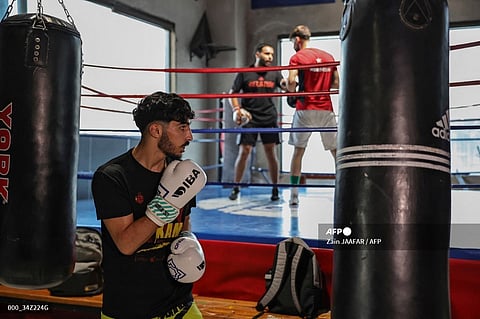
- NEWS
- the EDIT
- COMMENTARY
- BUSINESS
- LIFE
- SHOW
- ACTION
- GLOBAL GOALS
- SNAPS
- DYARYO TIRADA
- MORE

BEITUNIA, Palestine (AFP) — Every morning Palestinian boxer Waseem Abu Sal checks texts from his Cairo-based coach — a Gazan who cannot travel to him in the occupied West Bank — to see his daily Olympics training schedule as he prepares to make history.
The 20-year-old will be the first Palestinian boxer to participate in the Olympics after he bagged a wildcard spot and now dreams of delivering the first-ever medal for the Palestinians when he competes in Paris.
“This has been my dream since I was 10 years old,” he told AFP the day after receiving the invitation last week.
“Every day I went to sleep and woke up thinking about how I could reach the Olympics.”
Abu Sal will take on his first Olympic fight on 28 July after an unusual training routine with his remote coach Ahmad Harara, 32, who is held back by Israeli travel restrictions.
“I only see him when I travel” for international competitions, Waseem Abu Sal told AFP at his gym in the occupied West Bank city of Ramallah, the seat of the Palestinian Authority (PA).
“He writes my training schedule every day, and I train in the morning, and again in the evening with coach Nader Jayousi.”
Harara said he could not see his star fighter because of “the occupation barriers between the West Bank and Gaza” as an ID holder of the latter territory.
“Since then, I have been overseeing Wassem’s training remotely,” Harara said.
The Palestine Olympic Committee has been represented on the International Olympic Committee since 1995 despite a lack of statehood.
Though Abu Sal did not make it through the Olympic qualifying rounds, he received a wildcard spot in a system that ensures representation for all countries at the Games.
The political reality of the West Bank — dotted by Israeli army checkpoints that restrict movement — means Abu Sal is fighting hurdles even before he makes history.
“Athletes from the West Bank can’t easily come to us,” he said.
His usual sparring partner in Ramallah outweighs him by several weight classes — 71 kilograms to Abu Sal’s 57 kg.
Another partner closer to him in weight is based in Jerusalem, on the other side of Israel’s security barrier, making regular training difficult.
“This makes it hard to hold tournaments, leading to less competition in the country,” he said.
Traveling abroad to train or compete comes with its own difficulties.
“Many countries deny visas to those with Palestinian passports, causing us to miss out on tournaments while waiting for visas,” he said.
When Abu Sal flies to Paris in July, he will do so from the Jordanian capital of Amman, which he will travel to from Ramallah by road, as he usually does when going abroad for competitions.
Nader Jayousi, head of the Palestinian Olympic delegation that will send seven athletes to Paris this year, is a mentor to Abu Sal.
At the official’s Ramallah gym, Waseem trains alongside other promising young boxers under his watchful eye.
As the Olympic prospect spars, a mix of rap and traditional Palestinian songs fills the gym.
“It’s a proud moment, not just for me, but for Palestine as the first-ever Palestinian boxer will represent Palestine at the Olympics,” Jayousi said.
He echoed Abu Sal’s concerns about restrictions.
